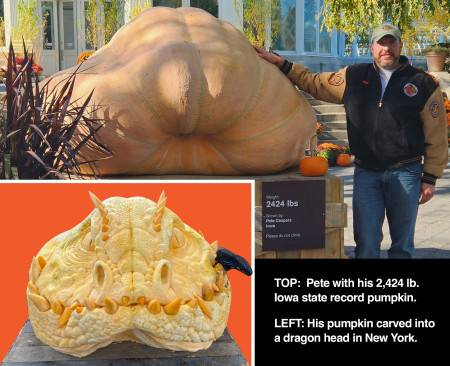It’s a Great Pumpkin, Mr. Caspers

MINNEAPOLIS, October 30, 2023 (Newswire.com) - For most kids, carving a pumpkin is as far as their fascination goes with this gourd. But not Pete Caspers, who recently grew a giant pumpkin with the help of EarthScout's Soil Moisture Sensor.
“In 1994, my stepdad met with a pumpkin farmer, and he gave me a plant to try,” said Pete. “I grew my first pumpkin to 393 lbs. Then, I spent 11 years trying to get the Iowa state record of 1,662 lbs., and I kept it until 2019.”
Last year, Pete and his daughter Alba again set the state record with a whopping 2,424 pounder. It was the 10th largest pumpkin ever in the U.S., and the 19th in the world. The pumpkin was carved into a dragon head in New York.
According to the Great Pumpkin Commonwealth (www.gpc1.org), the first world record pumpkin was grown in 1900, and weighed 400 lbs. Almost 100 years later, the first 1,000 lb. pumpkin was grown. In 2012, Ron Wallace grew a 2,009 lb. pumpkin - it was the first one-ton vegetable. The current world record was set recently by Travis Gienger and weighs a staggering 2,749 lbs. That’s one great pumpkin!
So, what has led to these ginormous pumpkins?
“Advances in plant genetics, irrigation, and soil technology,” Pete said. “Genetics play a key role in growing these giants. Seeds from a champion pumpkin can lead to a champion next year. From there, it’s consistency, lots of water, and a little luck.”
What's your process?
“In April I’ll place 4-5 seeds in a Ziplock bag with paper towels,” said Pete. “When a root sprouts, I put the seeds in peat pots under grow lights. Once they grow their first true leaf, I move them into grow bags in my basement.”
“May 1st I move them outside to hoop houses with heating cables on the ground, and that’s when the real work begins,” he says. “With weather changes I’m constantly adjusting things. They stay in hoop houses until the vine is 7-8 feet long and then I remove the houses around the 3rd week of May. For the next month I’m burying and pruning vines.”
“With burying vines, if you put dirt at the bottom of each leaf stalk, it'll create another root out of the top. The more roots, the more water it draws, and the bigger your pumpkin gets,” said Pete. “About June 15th I’ll get a baby pumpkin, and day 20 we pollinate. My daughter Alba does that.”
How much water do you use?
“When I got an EarthScout Soil Moisture Sensor (www.earthscout.com) and put it in my garden, I was only using 500 gallons/week. But with EarthScout I realized I wasn’t watering enough. I was like, holy cow…using the app I could literally watch my pumpkins suck water out of the soil. The ability to see the soil moisture percentage realtime changed my world. So, I increased my irrigation to 4,000 gallons/week to maintain a 37% soil moisture and watched my pumpkin grow 53 lbs. a day for 15 straight days. It was amazing! Before EarthScout, my best pumpkin was 1,707 lbs. Last year using EarthScout I grew the Iowa state record 2,424 lb. pumpkin.” This summer, Pete grew Iowa’s 2nd, 3rd, and 4th all-time biggest pumpkins. Since using EarthScout, he's grown Iowa’s 5 largest pumpkins of all-time.
How do you transport your pumpkins?
“We use straps and attach a chain to a skid loader to lift it, and put it on a pallet. We then put it on a flatbed for hauling to a competition,” said Pete. “Afterwards, I put them on display in my front yard.”
How do you clean out a giant pumpkin?
“I use a machete to cut a hole and then climb in and scrape it out,” he said. “On my 2,424 pounder, my daughter and I both got inside together to hollow it out. It’s funny, when I first cut the hole and attempted to climb in my shoulders slid in and I got stuck. I yelled to my wife for help, but she thought I was joking. She finally came over and pulled me out by my suspenders.”
EarthScout is a Minnesota based AgTech company that produces smart agriculture IOT products that leverage cellular, wifi, and bluetooth technologies for helping farmers conserve water and increase yields. Learn more at earthscout.com.
Source: EarthScout
